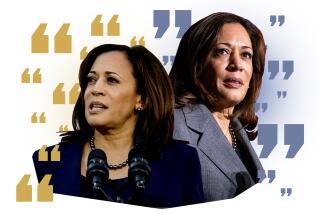Ex-War Protester David Harris Writes Book About the NFL
- Share via
MILL VALLEY, Calif. — The image of David Harris first jumped out at America during the nightly news broadcasts of the turbulent, antiwar years in the late 1960s.
Nearly 20 years later, Harris once again has caught the public spotlight as the author of “The League: The Rise and Decline of the NFL” (publisher: Bantam).
Harris, 40, had a high-profile among the 1960s war protesters because of his marriage to folk singer Joan Baez. Life Magazine, among others, featured stories on the couple.
In 1966, Harris returned his draft card to a San Francisco Bay area selective service board. Two years later, he was arrested when he refused to comply with a draft induction notice. In Jan. 1968, he was convicted of resisting the draft and sentenced to 20 months in federal prison.
Since that time, Harris has been living quietly as a freelance journalist in the Marin County community of Mill Valley. That is, until his book on the NFL hit the stands in early October. Now Harris finds himself sought out by interviewers and radio talk show hosts.
“Professional football was something that everybody knew about on Sunday, but not the rest of the week,” Harris said. “Here were 28 guys running one of the country’s biggest business enterprises. It looked to me as if there was a great recipe for a book on power. And that is exactly what I found.”
The idea first came to Harris when he did a feature piece on NFL Commissioner Pete Rozelle for the New York Times Magazine. The interview and article opened the door to the commissioner’s office.
“I took the direct head-on approach,” he said. “I got a lot of time with Rozelle and then set about to interview what I thought were the 15 or so owners who seemed to be at the heart of what was going on in the league.
“Most were pretty cooperative, but there came a point when a few thought I was a spy for the USFL.”
Harris also benefited from the fact that there had been a great deal of legal wrestling among the owners and the league over the last 10 years.
“There were eight major court cases involving these guys (the owners),” Harris said. “That gave me an enormous amount of public records to go through.”
In his book and away from it, Harris believes like many that the era of lawsuits in the NFL has helped bring about the league’s decline.
“They (the lawsuits) have certainly unraveled the NFL,” he said. “The NFL defended itself in the (Raiders managing general partner Al) Davis case as one entity and the court ruled the league was 28 separate businesses. The league could no longer tell the owners what to do.”
Harris also examines Rozelle’s situation. He credits the NFL economic gold rush in the 1970s to Rozelle’s handling of television and ability to install what the author calls “league think” -- which has the owners thinking as a league instead of as individual business owners.
“I think Rozelle’s future is very limited now,” Harris said. “He has said he was not going to stay past his current five-year contract, but he told me he may resign in as little as two years.”
The lifelong San Francisco 49ers fan said in writing the book one of his preconceived notion about the NFL was pushed aside.
“The stereotype of the owner being a rich man who bought the team for a plaything was inadequate,” he said. “Most of them didn’t come from great fortunes. Joe Robbie was making $28,000 a year when he went to the Miami Dolphins. But what has happened is that the enormous escalation of franchise values has made these men rich.”
Harris said his three years of research into the NFL would seem to indicate that the trend of escalating franchise value was about to end.
“The financial base of the league is changing,” Harris said. “There has been more ownership turnover in the last few years than in any other time in league history. But the one thing that really made me think that the money in the NFL is beginning to decline was learning that (Tampa Bay Bucs owner) Hugh Culverhouse was thinking about selling the Bucs. He’s the financial sharpie of the league.”
Harris said he has not gotten any direct feedback from the book, but indirectly he’s been told many owners are surprised with all the material he was able to gather on the league.
“Their minds seem to have been blown by how much I was able to find out,” he said. “Some have adopted all kinds of theories about how I was able to do it. It just shows the degree of paranoia that has developed among the owners.”
Harris, whose next project is the official biography of CBS president William S. Paley, said he forced himself to separate the football fan in his nature from the reporter.
“I’ve been a lifetime 49ers fan,” he said. “When I went into this project, I didn’t want my fan-ness to get in the way of being a reporter or vice versa. I don’t think I could watch a football game on Sunday anymore if I thought about the owners and not about what was going on the field.”
More to Read
Go beyond the scoreboard
Get the latest on L.A.'s teams in the daily Sports Report newsletter.
You may occasionally receive promotional content from the Los Angeles Times.










